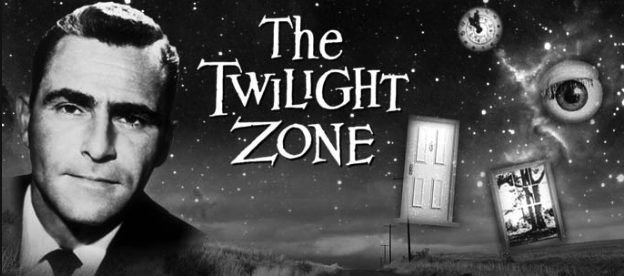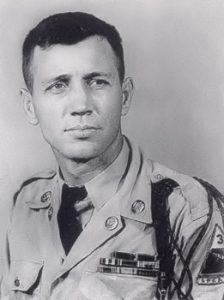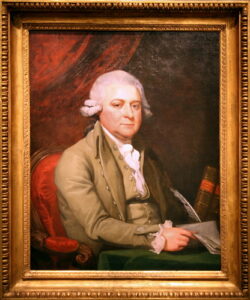I think it’s criminal that we are not permitted to make dramatic note of social evils that exist, of controversial themes as they are inherent in our society. I think it’s ridiculous that drama, which by its very nature should make a comment on those things which affect our daily lives, is in a position, at least in terms of television, of not being able to take that stand. —Rod Serling (1959)
Rod Serling, born Edwin Rodman Serling on December 25, 1924, would become one of America’s most important writers and producers of television dramas and screenplays primarily because of his vocal disapproval of censorship in the media. Before he began to seek new forms of media with minimal censorship, he was a successful writer for Playhouse 90, an American anthology drama. There, he wrote emmy-award winning scripts for “Patterns” (1955), a dramatization about corporate power, and “Requiem for a Heavyweight” (1956), which showed the struggles of a retired boxer in the aftermath of his 17-year career.1 However, it was Serling’s “A Town Has Turned to Dust” that would be his most controversial moment as part of the Playhouse 90 crew and would lead him into his next project as a writer. “A Town Has Turned to Dust” followed the story of Emmett Till, the young black boy brutally murdered in 1955 for allegedly whistling at a white woman in Mississippi. CBS decided to censor Serling’s script by making the black boy that was supposed to represent Till into a Mexican boy; they also made it seem as though it was the boy’s fault by depicting him as “getting out of line.”2 The network’s censorship removed many of the painful truths regarding the prejudices in America during this time. Serling would turn to the avenue of science fiction in order to escape this kind of censorship; in the words of Serling, “You know, you can put these words into the mouth of a Martian and get away with it.” Serling’s desire to get away from censored forms of media led to the creation of The Twilight Zone (1959-1964), a science fiction series that showcased people’s greatest fears ranging from alien invasion, death, ghosts, and even the effects of the Cold War on American society.3

Along with his criticism towards racial prejudice, Serling had his objections to the Cold War. The themes of the Cold War were largely absent from sitcoms and dramas during the 1950s; however, the episodes of The Twilight Zone, titled “The Shelter” (1961) and “Third from the Sun” (1960), discuss the effects of the Cold War head-on.4 In these two episodes, Serling brings forth the fears of the American people that were prevalent during the Cold War era (1945-1991) in terms of the overall anxiety and anticipation for a nuclear holocaust as well as the effects that the arms race had on the American psyche.
“Third from the Sun” deals more directly with the arms race and the creation of the hydrogen bomb. It was believed that the Americans were the only ones in possession of the atomic bomb; however, in 1949, the Soviets tested their first atomic bomb leading Truman to begin the quest for creating a more powerful bomb—the hydrogen bomb.5 Before the creation of this bomb, many people questioned the necessity of it. Would America win the arms race and would that be the end of it? Or would Russia create a hydrogen bomb as well? To address this question with our knowledge now, when the United States created the first hydrogen bomb in 1952, the Soviets followed suit with the creation of their first hydrogen bomb in 1955.6 Now, two nations were in possession of the world’s most powerful bomb. As Harold C. Urey stated, “Suppose that two countries have the hydrogen bomb…I would say that the probability that a war will start is increased if two groups each believe that they can win that war.”7 With the creation of the hydrogen bomb in both the U.S. and Russia, both countries were capable of obliterating the other. This is seen in “Third from the Sun” when Will Sturka, a scientist that works on hydrogen bomb production, learns from a suspicious coworker that the company planned on setting off a bomb in 48 hours. With this information, Sturka and his friend, Jerry Riden, a pilot of an experimental spacecraft, decided that it was time to move to Earth, the third planet from the Sun, in order to save their family from a nuclear holocaust. Hypothetically, we see that in the case of a nuclear holocaust, due to the mass destruction and horrors that a hydrogen bomb would produce, moving to another planet would be the best option. However, how many people have that option? Serling questions the necessity of using a hydrogen bomb because in the end, no one wins and all it brings is devastation and death.8

In relation, “The Shelter” shows the anxiety and hysteria that laid within the minds of the American people, knowing that at any moment, the enemy could drop a bomb on America and everything would change. In this episode, Dr. Stockton’s birthday party was interrupted by a radio announcement that there was a detection of a UFO, most likely missiles, en route to the U.S. and everyone is advised to seek shelter. Out of all the people present at the party, Dr. Stockton was the only one who had a shelter prepared. While everyone frantically ran to their houses to figure out what to do, Dr. Stockton and his family started to collect water, food, and things for entertainment into the shelter. The neighbors began to come back to Dr. Stockton’s house and tried to guilt him into letting them stay in his shelter with his family; however, the shelter could efficiently protect only three people. After the doctor refuses to allow any of the neighbors into his shelter, the neighbors try to break into the shelter in their last attempt to save themselves. At the end of the show, the advisory is called off and the friends of Dr. Stockton are ashamed that they put him and his family’s lives in danger because they were not prepared for a missile attack. Serling is sending a powerful message about the unpleasant aspects of human nature that can occur in life-or-death situations, as well as the importance of being prepared for this worst (even though people did not want to think about it).9

From these two episodes of The Twilight Zone, we see the ugly tendencies of human nature in regards to selfishness during a crisis in order to save one’s self, the unfortunate willingness of countries to bring another country to complete destruction via hydrogen bomb, and the importance of disaster preparedness. If Serling had tried to write these scripts for Playhouse 90, the messages would most likely have been completely distorted by the network’s need to censor material in order to protect their interests. The beauty of The Twilight Zone came from the fact that Serling could deliver powerful, uncensored messages in a half-hour span, delving into people’s worst fears and opening their eyes to the harsh reality that was bestowed upon them.

In 1964, after airing one-hundred-fifty-six episodes, The Twilight Zone was cancelled and Serling took to the lecture circuit where he delivered speeches to crowds in which he was able to speak more freely and openly. Just as Serling showed his disapproval for the Cold War in these two episodes of The Twilight Zone, he often talked about his disapproval for the Vietnam War in his lectures: “America’s destiny…lies on the streets of Newark, Miami, Chicago, Los Angeles and Harlem…not in Saigon. And certainly not at the cost of twenty-thousand dead American boys.” 10 In his lectures, Serling did not have to put these words into the mouth of a martian. Through his lectures, Serling was now able to express the emotions that so many Americans felt during times of war in a more direct way—without the necessity of crafting a masterful thirty-minute, science-fiction episode just to escape the scrutiny of media censorship.
- Encyclopedia Britannica, 2016, s.v. “Rod Serling.” ↵
- Meredith Brenner, “Thirty Minute Reality Check: How The Twilight Zone Reflected American Society in the 1950s,” (Thesis, University of Maryland, College Park, 2004), 1. ↵
- Meredith Brenner, “Thirty Minute Reality Check: How The Twilight Zone Reflected American Society in the 1950s,” (Thesis, University of Maryland, College Park, 2004), 1. ↵
- Heather Lunney, “Exploring the Cold War through The Twilight Zone: Five episodes in a journey to a dimension of sight, sound and mind,” History in the Making Vol. 3, no. 1 (2014): 40. ↵
- Richard Dean Burns and Joseph M. Siracusa, A Global History of the Nuclear Arms Race: Weapons, Strategy, and Politics 2 Volumes: Weapons, Strategy, and Politics (Santa Barbara, CA: Praeger, 2013), 37. ↵
- Richard Dean Burns and Joseph M. Siracusa, A Global History of the Nuclear Arms Race: Weapons, Strategy, and Politics 2 Volumes: Weapons, Strategy, and Politics (Santa Barbara, CA: Praeger, 2013), 34. ↵
- Harold C. Urey, “Should America Build the H-Bomb?,” Bulletin of the Atomic Scientists, March 1, 1950, 73. ↵
- “The Shelter,” The Twilight Zone, directed by Lamont Johnson (Los Angeles: CBS, 1960). ↵
- “The Shelter,” The Twilight Zone, directed by Lamont Johnson (Los Angeles: CBS, 1961). ↵
- Rod Serling (lecture presented at Moorpark College, Moorpark, CA, December 3, 1968). ↵



76 comments
Bryon Haynes
The Twilight Zone is one of the most iconic and memorable shows in American history, and this article did an excellent job of both entertaining and informing us about it. Rod Serling’s influence can still be felt in Hollywood today, where the content is less censored and prominently features the voices of marginalized communities in an authentic manner. This show is timeless because it capitalized on people’s fears and turned them into genuine entertainment, which Hollywood now frequently satirizes.
Geraldine Fry
This was such an interesting take on the popular TV series Twilight Zone. I never knew that the show was an allegory for the cold war. I am surprised there was such censorship back then where you could not just talk right out about your opinions. I would have never guessed that someone would go through all the trouble of making a science-fiction show just to express their political opinion without censorship.
Andrea Tapia
Great article, It definitely pointed out the different aspects of what the Twilight zone was about. This show was a good way to inform others about the fears of a hydrogen bomb and the events that went through there. Talking about alien invasions, death, ghost, and even the effects of the Cold War. I found it fascinating how Serling used his creative mindset to bring out the messages of each episode to his audience, so they can think about the whole situation themselves. I haven’t seen the Twilight Zone myself, but have heard it being talked about through social media. I loved how this article was able to capture the anxiety and problems that were happening during that time. It is definitely a very educational show for many viewers and the quotes given in the article helped me out even more about what the show was about.
Danielle Sanchez
This article was well written and I enjoyed reading it! Rod Serling’s desire to get away from censored forms led to the creation of The Twilight Zone which took place from (1959-1964). This science fiction show showcased a range of people’s greatest fears such as ghost, invasion, and even the effects of the cold war on American society. In 1964 the Twilight Zone was cancelled after one-hundred-fifty-six episodes.
Veronica Lopez
This article was well-written and I like the topic you chose. I used to watch the Twilight-Zone growing up and I loved to watch it. It was interesting to watch this show because I feel like it was a direct criticism to the American government. Although I didn’t understand the show growing up, I like how your article refreshed my mind and gave me a new perspective on the show.
Amelie Rivas-Berlanga
This was such a great topic to write about, I loved the Twilight Zone as a kid! You did a great job at portraying how people felt during the time. I was young so I did not realize that the episodes had a message behind them, so it was fun to read the meaning behind this episode. The episodes had a great topic, showing Americans their true nature. Serling was ahead of his time and The Twilight Zone will forever live on.
Phylisha Liscano
Hello Mariana, this was a very interesting article. You provided great images. I had very little prior knowledge of Rod Serling and The Twilight Zone. He used a platform to inform people about the fears of a hydrogen bomb and the events that follow it. Overall, great article, and I enjoyed getting the chance to read it.
Eliza Merrion
This article was very educational and fascinating. I learned a lot more about the cold war through Rob Sterling and a media perspective, which was quite interesting. The article itself was very well written and I like how you added a lot of Sterling’s quotes. It helped me better understand him as a person and his motives for the twilight zone. Overall very good article.
Ruben Becerril
I’ve heard of The Twilight Zone a few times but never really knew what it was. I found this article to be very informative and interesting. I thought that the messages of the episodes you mentioned were very impactful in showing the consequences of the hydrogen bomb. I find it inspiring that although Serling’s show was canceled he continued to voice his belief through lectures.
Leon Martinez
The Twilight Zone, I remember watching these with my dad on Sundays after church growing up as a kid. I remember this episode because my dad would tell me exactly how the nation felt during this time when he was a kid in the 50s and ’60s. Your article has captured the ever so growing tension and anxiety that individuals faced during that time, The show was not just for entertainment back then, it was a way to get info out to the people that the newspapers were too afraid to put out. A tv show like this was just the perfect idea for this. The house I live in now was built in 1951, and we just discovered a bunker that was sealed up by the original owners, when exactly, no sure but the artifacts that were stored were sure a pleasured to see and catalog for my personal museum. Great job Ms. Sandavol, this was a pleasure and informative read.